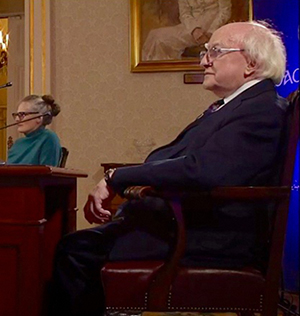MACHNAMH 100
Published in Book Reviews, Book Reviews, Issue 2 (March/April 2021), Reviews, Volume 29 https://www.youtube.com/watch?v=xn3EIhQYKNk
https://www.youtube.com/watch?v=xn3EIhQYKNk
Reviewed by Colum Kenny
Colum Kenny is Professor Emeritus at Dublin City University and author of The enigma of Arthur Griffith: ‘Father of Us All’ (Merrion Press, 2020).
President Michael D. Higgins has launched a series of in-depth seminars relating to the foundation of the Irish state. The first took place online in December 2020. (A second, on the theme of empire and resistance, will have taken place on 25 February 2021 by the time you read this.) Entitled Machnamh, meaning ‘reflection’, the series is designed with help from historian Gearóid Ó Tuathaigh of NUI Galway. This was reflected in the quality of the first session, transmitted from the State dining room in Áras an Uachtaráin.
The first session lasted two and a half hours, of which almost two hours consisted of addresses by Higgins and four guests. Questions followed, relayed from a few absent people invited to submit them. These included UK Ambassador to Ireland Paul Johnston (on teaching history in schools) and Dr Johnston McMaster of the Irish School of Ecumenics. The tricky role of memory in history is the study of French philosopher Paul Ricoeur, whom Higgins cited. He recalled that Ricoeur wrote that ‘to fail to remember’ is to ‘kill the victims twice’. What’s forgotten may be as important as what is recalled.
Speaker Ciarán Benson, professor of psychology, said that we cannot change the past but we may alter, improve or animate descriptions of it. He asked pointedly: ‘Is THE past in the past?’ and ‘Should we think of the past as having a future?’ Benson observed: ‘The more we learn from newly discovered materials in archives or letters, the more we can anticipate changes in the past’. Indeed, what historian has not had to revise an assumption when stumbling on even one piece of information that he or she did not have sooner?
Michael Laffan, retired UCD professor of history and author of The resurrection of Ireland: the Sinn Féin Party 1916–1923, among other works, discussed the relative scale of atrocities internationally, saying that ‘The Irish benefited from the fact that they were fighting a democracy’. This fact may be too easily overlooked by media and others when commemorating acts of violence or of wild men. The strong democratic mandate that Sinn Féin won from a greatly expanded franchise in 1918 ultimately assured independence for the majority of Irish people who wanted it. Laffan also recalled the ‘formidable underground administration’ of the First Dáil, one that was led by its acting president, Arthur Griffith, for most of the War of Independence when Dev was in America. Laffan believes: ‘We should acknowledge the remarkable attempt, partly successful, not merely to wage a guerilla campaign but simultaneously to set up a counter-state’.
Occasionally one glimpsed the portrait of some former president over a speaker’s shoulder. Mary Robinson or Mary McAleese may have wondered why, out of six participants (including broadcaster and historian John Bowman, who facilitated discussion), only one was female. This was Professor Anne Dolan of Trinity College, Dublin. Her 2003 collection of essays, Commemorating the Irish Civil War: history and memory, 1923–2000, was a milestone in interpreting the troubled period that we are now recalling.
Conscious of gender imbalance, President Higgins reassured viewers that he wants an equality of participation by women in the series. Speakers protested the importance of seeing women in history, but it was not suggested that women had a role equal in power to that of men in the struggle for independence between 1900 and 1923. The third seminar is to examine gender and social class.
Joining the first seminar from abroad was Prof. Joep Leerssen of the University of Amsterdam, a cultural historian who has written on Irish nationality. He warned of a human tendency to display rancour as though it is that of the other rather than our own: ‘Group antagonism is at its most virulent and at its most intractable when it is in camouflage and when it is unacknowledged’.
Concluding, President Higgins touched on the benefits and challenges of truly local perspectives:
‘Places have had embedded upon them versions of history which it is very, very difficult to change. There is very little revisionism possible in some of the places because the folk-story has taken on a particular colour. There is a huge difference between someone doing local history in which it is really local and inclusive and drawing on everybody who is in the locality and, for example, someone who has taken a grand narrative and imposed it on a place of stones or on a bog or on a field.’
The president’s father was a Volunteer during the War of Independence and his father’s family, like so many, split on the Civil War. President Higgins expressed a particular interest in differentiating between the social classes from which Volunteers came, as well as between the relative levels at which these were enabled to participate later in running the state.
Neither of the state-funded broadcasters, RTÉ and TG4, has excelled itself so far during the centenaries by imaginatively stimulating radical debate about political assumptions and myths. However, President Higgins is making an effort and his first seminar was engaging, if somewhat abstract. It remains online as both a valuable teaching resource and a public service.
The Machnamh series is intended to run over twelve months, and to consider the War of Independence, the Civil War and Partition. President Higgins is said to be keen to dwell on aspects of our past that have been given less attention than they merit.
















